In the time of Covid-19, opportunities for people to gather are shifting online.
The Alumni Association of ex-participants that have returned to their home countries after participating in the JICA training program have deepened their learning through online seminars (Webinars).
In a development unique to the online world, Japanese experts have also been able to participate in spite of the distance apart.
Honduras - Building bridges between Japan and Honduras
The Asociación Hondurena de Becarios de Japón (AHBEJA) has held webinars with members in Honduras taking advantage of teleworking in the time of Covid-19 . Each ex-participant shared their own experiences gained from the training program in Japan on topics such as energy, ecotourism, entrepreneurship, and life improvement etc. 10 webinars have been held as of August 2020 and have averaged 40 people from both Honduras and abroad. They are also recognized by the embassy as a project related to the 85th anniversary celebration of diplomatic relations between Japan and Honduras. AHBEJA has a record of spreading Judo and Japanese language education and has received an award from the Ministry of Foreign Affairs.

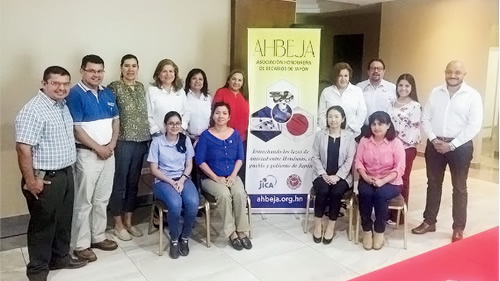
Executives of the Alumni Association of ex-participants at the 2019 Alumni Association Assembly.
Brazil - 5,300 people gathered for 7 webinars
Webinars have been held by Associação Dos Bolsistas JICA - Sao Paulo (ABJICA), Associação Brasiliense de Ex-Bolsistas Brasil-Japão (ABRAEX), and Associação Nordestina de Ex-Bolsistas e Estagiários no Japão (ANBEJ) with mainly young Japanese descendant members. Discussions have been held on the concepts of "manufacturing" for the next era, how to strengthen management capacity, and tourism development in Tomé-Açu in the northern Amazon region of Brazil, pioneered by Japanese immigrants. 7 webinars have been held so far, and 5,300 people have participated. One of the speakers had started producing masks in his own company and has donated these to various organizations with support from local Japanese organizations and JICA.


Japanese "manufacturing" was discussed at the webinar held in July.
Argentina - Increasing regional productivity through networking!
The "Latin America Productivity Network," formed by 20 organizations from 15 Latin American countries that promote the quality and productivity of companies, began in earnest in 2020 . Webinars on business management and productivity improvement are planned to be held every two weeks, or 16 times from May to the end of 2020. The total number of registered participants up to the 8th webinar was 2,550. Organizations from Colombia, Uruguay and Argentina are mainly in charge of the lectures, and cross-country exchange is expected to be a highlight.


A leaflet announcing the webinar.
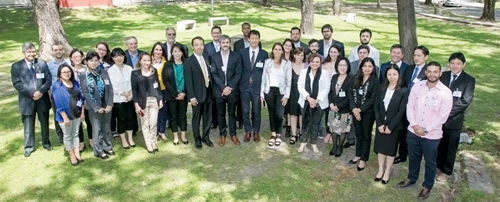
Members gathered at the first meeting of the Latin American Productivity Network
Mexico - Caring for the mental health of children
With the spread of the coronavirus in Mexico, the number of children suffering from anxiety in their everyday lives is increasing. Through disaster prevention education under the SATREPS Project [1] , disaster prevention organizations have learned the importance of mental health care for children. Therefore, on July 7, experts with many years of experience in the mental health care of children in disasters were invited from Japan and a webinar was held to consider what could be done in the education field. 6,788 people participated including school officials from Mexico City and various regions, showing the high level of interest in caring for the mental health of children.

Note
- [1]"The project for hazard assessment of large earthquakes and tsunamis in the Mexican pacific coast for the mitigation of disasters," Science and Technology Research Partnership for Sustainable Development.
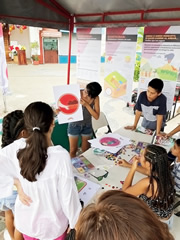
The dissemination of knowledge about mental care is an important part of disaster prevention and this project develops teaching materials for local areas and carries out disaster education.
Seminars on the field of elderly care led by ex-participants
The Asociación de Exbecarios Nikkei de México (ASENIM) has held seminars from 2015 in conjunction with the government to consider elderly support in Mexico. This has contributed to the amendment of laws defining the elderly and the realization of loans for the elderly. A seminar was held in February 2020 around the topic of elderly care rooted in the community, with doctors and researchers that were involved in community medicine in Japan as lecturers. About 160 people participated, not just from Mexico but also from international organizations. ASENIM Chairman Mr. KAWABE Jun noted that "Covid-19 has shown the necessity and importance of elderly care. I want to share knowledge from Japan so that they don't become the socially vulnerable ." A webinar on elderly care is also planned to be held in February 2021.

Seminar held in February.
Bolivia - Better development beyond the country
In Latin America, there is the Federación Latinoamericana y del Caribe de Ex Becarios de Japón (FELACBEJA) that is joined by the Alumni Associations of ex-participants in each country. The Bolivian Alumni Association of ex-participants has actively carried out cross-border webinars taking advantage of this alumni association network. Study groups have also been held between Honduras and Colombia with locally hired staff at JICA overseas offices. They have learned from each other in many areas including proposing methods of Japanese "Kaizen" [2] for small and medium-sized farmers, beginning to consider "Sabo" sediment disaster prevention methods developed in Japan, and many other fields such as medical care and disability care, etc.

Note
- [2]Philosophy and method by which manufacturing quality and productivity were increased during Japan's high economic growth period.
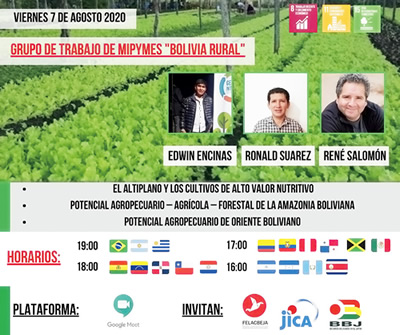
Screen announcing the webinar considering the development of small-scale farming. Ex-participants worked together locally.
Connecting Japan and Latin America through Gastronomy
JICA has been conducting training on the topics of vitalizing the societies of Japanese descent and local communities through food culture, and many people have played an active role because of this.
Fourth-generation Japanese descendant Ms. TSUNEKAWA Mayumi runs a café in Chile where you can enjoy Japanese sweets. She remembers "When I was little, I loved the nerikiri and steamed manju buns that a group of Japanese descendant grandmas made, and I wanted to be able to make them myself someday." After training at a Japanese sweet shop in Kyoto and JICA food business, in 2018 she opened her own shop. She told us of her dream of "getting many Chileans to know the world of traditional Japanese sweets."
Ms. IZAWA Saiko is a French cuisine chef who emigrated to Brazil with her family when she was 15. She started selling bread when she was raising her children and then started to fully study in 2001 when she received Le Cordon Bleu [3] training as part of a JICA program. Since then, she steadily built her career to be at the forefront of the Brazilian restaurant world, and in 2017 she was selected by "The World's 50 Best Restaurants [4] " as the best patisserie chef in Latin America. Her western confectionary made with Brazilian ingredients and Japanese sensibility was very well received. Ms. Izawa says that "Brazilian food culture is part of my life." She said powerfully that in the future she "also want to focus on how I can share the charms of Brazilian food culture, which is still unknown in Japan."
Notes
- [3]A culinary vocational school developed by the French Culinary Education Institute
- [4]A restaurant ranking and chef commendation sponsored by British food magazine "Restaurant."
"Sakumu" Owner
Ms. TSUNEKAWA Mayumi
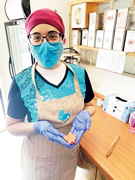

Anmitsu hand made by Ms. Tsunekawa
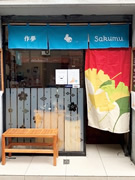
"Sakumu" in Santiago, Chile.
Chef
Ms. IZAWA Saiko


Dessert using 7 ingredients from the various regions of Brazil, including a fruit called cambuci.




scroll